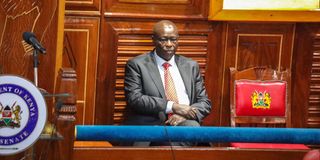Premium
Court of Appeal suspends hearing in 40 Gachagua cases

Former Deputy President Rigathi Gachagua during his impeachment hearing at the Senate, Parliament Buildings Nairobi on Wednesday, October 16, 2024.
What you need to know:
- The hearing of petitions challenging the impeachment of former Deputy President Rigathi Gachagua has been suspended by the Court of Appeal pending the outcome of his appeal.
- Gachagua is challenging the power of the Deputy Chief Justice to appoint a three-judge bench to hear the cases, arguing that this power is reserved for the Chief Justice.
The hearing of petitions challenging the impeachment of former deputy president Rigathi Gachagua has been put on hold pending his appeal.
Mr Gachagua moved to the appellate court to challenge the powers of the Deputy Chief Justice Philomena Mwilu, to appoint a bench of three judges to hear the more than 40 cases.
He has maintained that the appointment of a bench of uneven number of judges is the preserve of the Chief Justice Martha Koome.
“Meanwhile, the High Court proceedings are stayed to await determination of these consolidated appeals,” Justices Daniel Musinga, Mumbi Ngugi and Francis Tuiyott said.
The judges directed said they will deliver the judges of their ruling on May 9.
The ruling was made ahead of mention of the cases before Justice Eric Ogola, Anthony Mrima and Fred Mugambi, for directions as to the hearing.
Through senior counsel Paul Muite, Mr Gachagua faulted the High Court in their ruling that stated that the Deputy CJ had the powers to appoint the bench.
The three judges had ruled that the mandate exercised by the Chief Justice under Article 165(4) of the constitution- on appointment of benches to determine weighty constitutional issues, was an administrative function and the DCJ can assign judges when she is discharging any of the constitutional functions on behalf of the Chief Justice.
The bench said that the constitutional mandate exercised by the Chief Justice under Article 165(4) of the Constitution is an administrative function and the DCJ can handle the same in the absence of the Chief Justice, to ensure constitutional responsibilities are carried out seamlessly without disruption.
“In our view, and in line with the doctrine of continuity in governance, the drafters of our Constitution were deliberate in ensuring that the administration of duties and application of constitutional provisions remain uninterrupted,” said the judges.
Mr Muite, however, said had the High Court applied purposive construction, it would have found that Kenyans consciously donated the power under Article 165(4) to the Chief Justice and excluded the Deputy Chief Justice.
The veteran lawyer said justice was a critical component of the rule of law and the circumstances surrounding the empanelment of the High Court bench “drove a dagger through public confidence in the administration of justice”, which the appellate court ought to rectify.
Mr Muite pointed out that the normal practice when the High Court certifies a matter as one raising a substantial question of law under article 165(4) requiring the Chief Justice to appoint a bench, the file is forwarded to the CJ who as a court of record, minutes the empanelment, the date and signature.
He added that all parties are then informed by the office of the Chief Justice. However, nothing of the sort happened in Mr Gachagua’s cases.
He said the Deputy Chief Justice orally and selectively assigned two matters with conservatory orders issued late that day, to the bench she constituted.
Mr Muite added that the bench, which had previously informed Mr Gachagua that the earliest it could hear him was on October 29, suddenly convened the following day- on a Saturday and it was available to hear the application by the Attorney General for lifting of the orders on Monday October 21, 2024.
Mr Muite said the sitting of the bench on a Saturday was in violation of Section 10 (7) of the High Court Organisation and Administration Act, since the Chief Justice had not authorised the bench to sit on that Saturday, which was not a normal court day.
“So that Deputy CJ constitutes this bench on Friday night, it sits the following day, Saturday and is now available to hear the Attorney General’s application for discharge of the conservatory orders the following Monday. What perception does this rush create in the minds of ordinary Kenyans? Mr Muite posed.
According to Mr Muite, the perception in the public mind was that the court jumped onto the bandwagon of Parliament and the Executive in the ‘breakneck’ speed with which the removal of Mr Gachagua as the deputy president was being propelled.
The former deputy president is also challenging the decision to lift a conservatory order, blocking Prof Kithure Kindiki from assuming office.
Prof Kindiki was sworn as the third Deputy President on November 1, 2024, a day after the High Court lifted the order, blocking him from assuming office.
In the petitions, Mr Gachagua challenged the impeachment, arguing that the allegations against him were founded on falsehoods and outright lies.
The former Deputy President said the motion to impeach him was founded on deceit, misrepresentations and suppression of material facts, which had been peddled to the public so as to achieve the improper and unconstitutional purpose.
He also argues that the one-day public participation process initiated by Parliament was not enough to 'overturn the sovereign will of the people' who voted for him and President William Ruto in the last general election.


